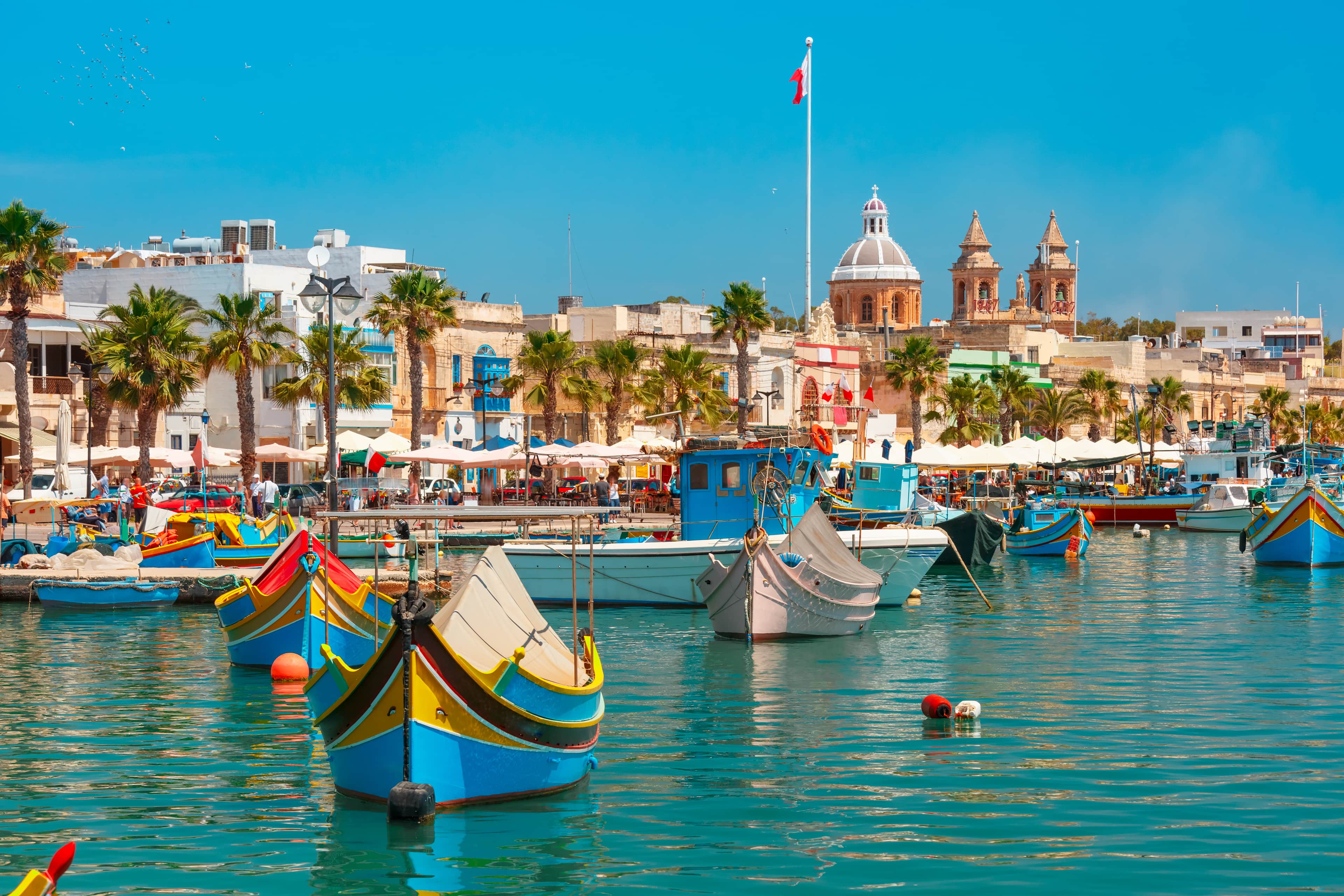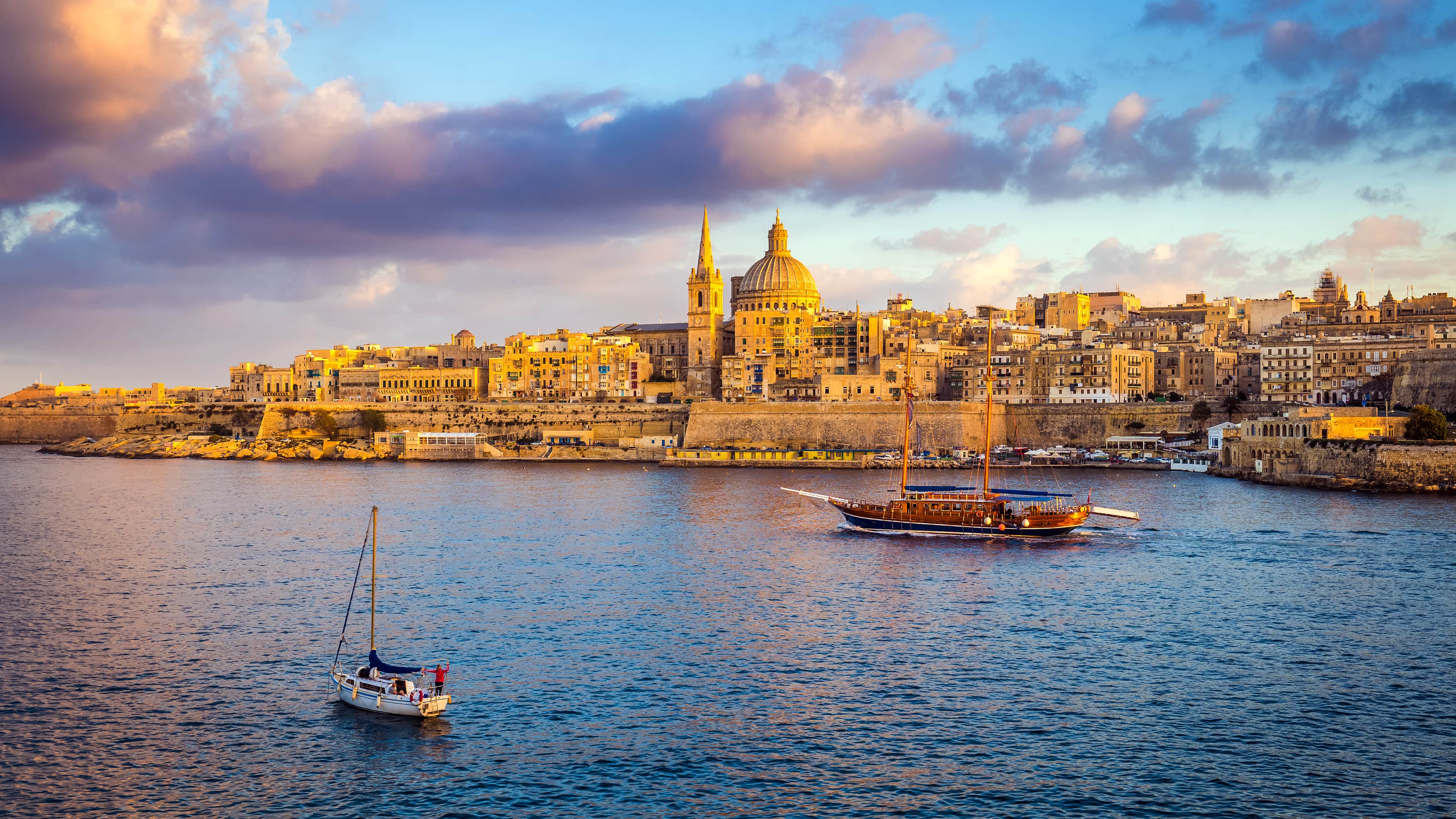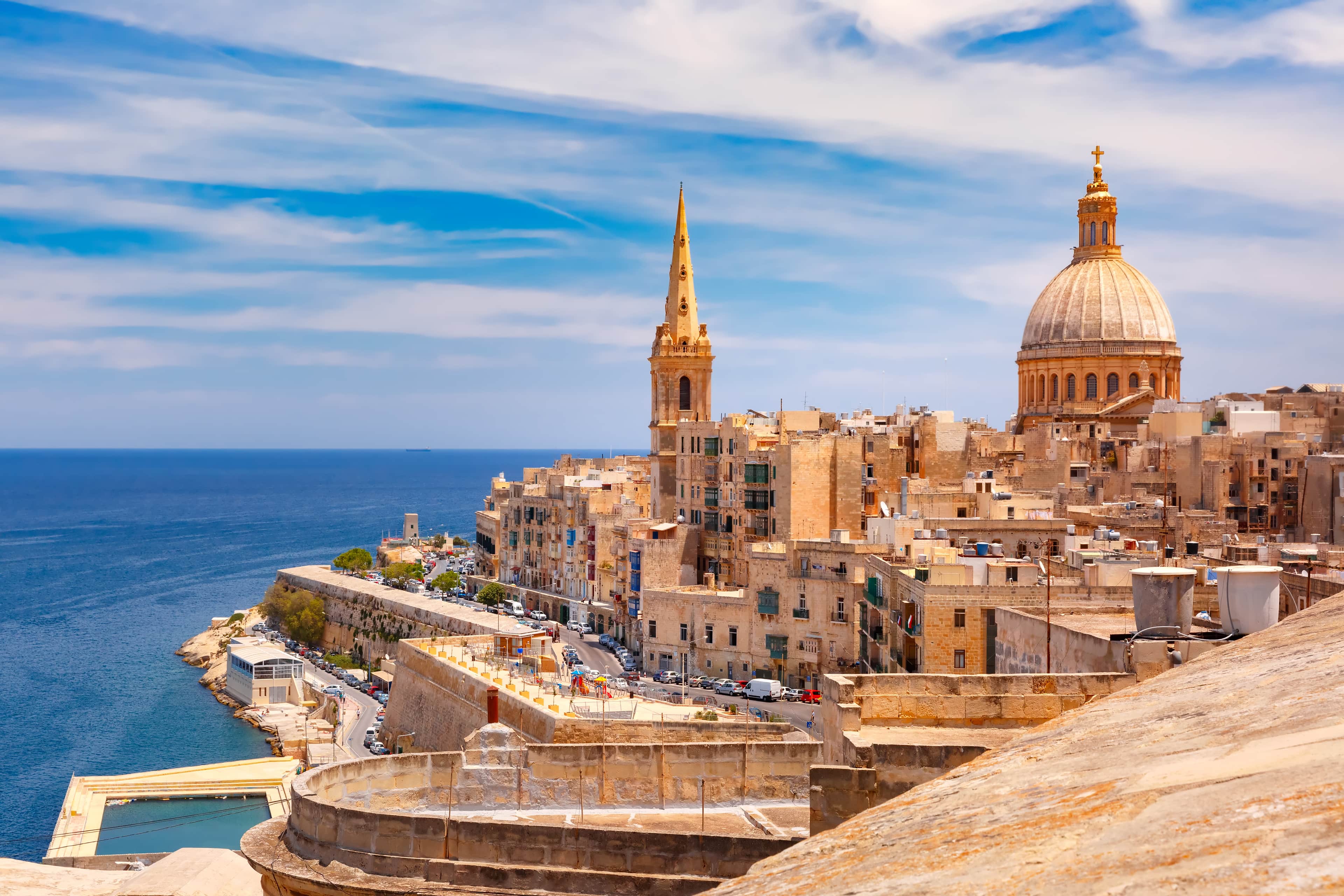Malta is a sought-after destination for investors seeking an attractive lifestyle and investment opportunities. Wealthy individuals prefer to buy real estate in Valletta or Sliema. The average price in these cities varies from €3,000 to €6,000 per m².
One advantage of a real estate purchase is an opportunity to obtain the country’s permanent residency in case of investing €300,000+.
This article will discuss the most essential information about Malta’s real estate market.

Property Investment in Malta: Complete Guide for Investors
Share:
Malta’s real estate market growth
Malta’s real estate sector has experienced impressive growth. The luxury market has performed very well over recent years, with rental yields pushing above 5%. This consistent growth makes Malta an attractive destination for wealthy individuals looking to invest in property.
Factors contributing to Malta’s strong property market performance:
economic stability — Malta provides a stable environment that attracts both local and foreign investors;
tourism industry — demand for short-term rental properties increases as tourism continues to grow on the Maltese Islands;
demand from expats — there is increased demand from expatriates seeking high-quality residential real estate options during their stay on the island.
The rise in rental yields can be attributed primarily to increasing demand within specific segments of Malta’s rental market, such as luxury apartments targeting affluent tenants and short-term vacation rentals. Investors can benefit from these rental yield trends by investing in properties that meet the requirements of targeted market segments.
For example, purchasing a high-end apartment in popular tourist areas like Sliema or St. Julian’s could generate significant rental income due to the consistent demand from tourists and expats alike.
Additionally, investing in smaller properties with unique features such as traditional Maltese architecture or stunning sea views may attract higher-paying tenants willing to pay a premium for an authentic local experience.

Explore the benefits and drawbacks of the Malta investment program versus other Golden Visas
Special Designated Areas developments
Many investors choose to purchase real estate in Special Designed Areas. A Special Designated Area (SDA) in Malta is a classification for certain high-end real estate developments.
These areas are treated as if they are outside Malta for property law. The main implication is that, unlike other properties in Malta, there are no restrictions on who can purchase properties in these areas. It ensures access to the best possible deals in local markets while quickly navigating legal issues.
Malta has several Special Designated Areas, each offering unique features and amenities tailored to cater to the needs of wealthy investors.

Tigne Point in Sliema, Malta, is one of the most popular neighborhoods in the SDA. It is a mixed-use development featuring luxury apartments, retail outlets, and leisure facilities with stunning views of Valletta's skyline
Investing in Special Designated Areas offers numerous benefits compared to traditional real estate investments in Malta.
No restrictions for foreign buyers. SDAs grant equal purchasing rights for EU and non-EU nationals without any conditions for owning multiple properties within these zones.
High rental yields. The demand for luxury properties in Malta’s prime locations, such as those found within SDAs, remains strong. It ensures a steady rental income and attractive yields for investors looking to capitalize on the Maltese real estate market.
Capital appreciation potential. Properties located within Special Designated Areas are known to appreciate value over time due to their exclusivity and high-quality amenities. Investors can anticipate a lucrative return when they eventually offload their assets.
Ease of resale. Selling your property is much easier than traditional investments, where potential buyers may face limitations based on nationality or residency status.
Investing in buy-to-let properties
Investing in buy-to-let properties can generate a steady income while offering eligibility for European residence and other benefits like political stability and excellent living conditions. The proximity to European countries makes it an even more appealing option for potential investors.
Benefits of investing in buy-to-let properties:
rental income — with Malta’s strong rental market, property owners can expect consistent returns on their investment through monthly rent payments from tenants;
tax benefits — non-resident property owners enjoy favorable tax rates on rental income earned within Malta, further enhancing the appeal of investing here;
diversification — adding a Maltese property to your investment portfolio helps diversify your assets geographically, reducing risk exposure tied to any single country or region.
Best areas in Malta to buy real estate
Northern and Eastern Harbors are the most popular and developed regions of Malta. The biggest cities located there are Sliema, St. Julians, St Paul’s Bay, and Msida. Residential properties are in high demand due to the cities’ location near the sea, beautiful landscapes and developed infrastructure.
The square meter in an apartment in Sliema costs €4,000, and in St Julians — €3,500.
Living in the capital appeals to those who like being surrounded by rich culture and architecture. Valletta is the most expensive city in Malta: a square meter apartment costs from €4,000 to €6,500.
Gozo Island is suitable for those who want to invest less money and live in a more tranquil environment, as this part of Malta is less developed.

Valletta is the capital of Malta, located on the board of the Mediterranean Sea
Best property types to invest in Malta
Malta has all types of properties you might be interested in: apartments, townhouses, penthouses, villas and others.
Apartments are the most popular option to invest in as they are always in high demand by tourists and expats. This type of residential property is usually located on one floor and has a spacious terrace.
Apartments are part of a condominium and share staircases, elevators and entrances with each other. The prices for maintenance of common areas are divided among all owners.
Modern buildings with luxurious apartments are usually located in big cities.
Villas are the second most popular option. They consist of several floors and are completely detached from one another. Villas usually have swimming pools and outdoor grounds. The best places for buying this type of object are Santa Maria Estate in Mellieha, High Ridge and Madliena in Swieqi.
Maltese taxation for foreign investors
The tax system in Malta is favorable towards foreign investors, offering competitive rates compared to other European countries. Non-resident property owners are subject to a flat 15% withholding tax on rental income derived from their Maltese properties.
Capital gains realized from the sale of immovable property in Malta are taxed at a final withholding rate of 8%. However, certain exemptions may apply depending on the holding period and primary residence status.
Stamp duty. One must typically pay stamp duty when buying a property in Malta. It is a tax on the purchase price of the property. The standard rate is 5%.
Capital gains tax. When you sell a property in Malta that is not your primary residence, you may have to pay a tax on the profit you made from the sale, known as capital gains tax — 8% of the selling price. However, there are some exceptions to this. For example, the rate may be reduced if you have owned the property for more than three years.
Rental income tax. If you rent out a property in Malta, the income you receive may be subject to tax. The rate is 15% for Maltese residents. Non-residents may be taxed at a different rate.
Property tax. Malta does not have an annual property tax like some other countries.
Maintenance of real estate
Basic bills in Malta include water, electricity, heat, and taking out garbage. On average, an owner of an 80 m² apartment pays around €100.
Electricity. Most Maltese families use electricity instead of gas. The rate depends on the number of people living in a residential property. The bills are calculated based on the meter reading that inspectors take. If the family lives in an apartment, the meters are located outside of it.
Water bills are also calculated based on the meter readings.
There is no central heating and gas network in Maltese houses and apartments. Residents use air conditioners and heaters to warm air and water. Gas is usually bought separately. A cylinder sufficient for 2—3 months costs around €20.
Garbage is taken out for free as the state pays for the services. The average garbage collection is once a week.
Remember that all waste must be sorted out and put in different containers.
Internet and mobile phones. A monthly Internet plan costs €30—35 depending on the provider. A monthly sum for a mobile phone is €25 on average. The plan includes the required number of calls and Gb of Internet.
Step-by-step process of buying real estate in Malta
Finding a lawyer
A lawyer will communicate with a property owner as it is forbidden to conduct a deal on your own.
A lawyer will communicate with a property owner as it is forbidden to conduct a deal on your own.
Choosing a property
The lawyer helps you to find a property, negotiate prices and conditions and check the trustworthiness of a property and its seller. The whole process takes 1—2 weeks.
The lawyer helps you to find a property, negotiate prices and conditions and check the trustworthiness of a property and its seller. The whole process takes 1—2 weeks.
Preliminary contract
Upon signing a preliminary contract you pay 10—15% of the property’s value. A deposit won’t be returned if you refuse to buy an object. If you plan to participate in the Malta Permanent Residence Programme, you can’t buy a property with a mortgage.
Upon signing a preliminary contract you pay 10—15% of the property’s value. A deposit won’t be returned if you refuse to buy an object. If you plan to participate in the Malta Permanent Residence Programme, you can’t buy a property with a mortgage.
Approval by the Ministry of Finances
If you buy an object outside the SDA, the Ministry of Finances must verify and approve your deal and transactions. This rule doesn’t apply to real estate located in SDA.
If you buy an object outside the SDA, the Ministry of Finances must verify and approve your deal and transactions. This rule doesn’t apply to real estate located in SDA.
Main contract and remaining payment
You must pay the remaining money when you sign a main contract with the owner. It will be credited to the notary’s account, and the investor will get a notarized copy of a sale and purchase agreement.
You must pay the remaining money when you sign a main contract with the owner. It will be credited to the notary’s account, and the investor will get a notarized copy of a sale and purchase agreement.
The whole process of buying real estate takes from a few weeks to 4 months.
Malta permanent residence when buying real estate
If an individual invests in real estate, they can participate in the Malta Permanent Residence Programme and obtain permanent residency there.
The requirement is to rent or buy a property. The costs are the following:
The property must be held for at least 5 years.
Besides investment, the applicant must pay several more fees:
an administrative fee of €40,000;
a government contribution of €28,000 if purchasing a property or €58,000 if leasing a property;
donate €2,000 to a local philanthropic, cultural, scientific, artistic, sport, or animal welfare NGO registered with the Commissioner of Voluntary Organisations.
To be eligible for the MPRP, applicants should:
be third-country nationals, non-EU, non-EEA, and non-Swiss;
not hail from sanctioned countries, as announced from time to time by the Agency;
not benefit under other pertinent regulations and schemes.
have stable and regular financial resources sufficient to maintain themselves and their dependents without recourse to the social assistance system of Malta;
show they have capital assets of not less than €500,000, out of which a minimum of €150,000 must be financial assets;
be fit-and-proper individuals and have a clean criminal record;
not pose any potential threat to the national security, public policy, public health, or public interest.
The investor can add their family members to the application. That includes a spouse, children and parents financially dependent on the principal applicant.
Benefits of obtaining residency by real estate investments
Visa-free travel. Maltese residents have the right to visa-free travel within the Schengen Area, which includes 29 European countries.
Tax advantages. Residents are only taxed on income remitted to Malta, with no wealth or inheritance taxes imposed.
High quality of life. With its warm climate, rich history, and excellent healthcare system, Malta consistently ranks among the top destinations for expats seeking a comfortable lifestyle.
Business opportunities. As a member of the European Union, Malta gives its residents various business opportunities available throughout Europe without facing restrictions on cross-border trade or investments.
Conclusion
The Maltese real estate market is constantly growing due to the demand from both tourists and expats.
Most objects attractive to investors are located in Special Designated Areas. They are places where both EU and non-EU nationals can own properties under the same conditions.
Investors buy properties in the country to earn money and obtain permanent residency in Malta.
The investor must rent or buy real estate to participate in the Malta permanent residency program and pay several fees. The minimum investment under the program is €150,000.
With Malta permanent residence, you can benefit from visa-free travel within the Schengen Area, tax advantages, high quality of life and business opportunities.

Download our complete guide to learn everything you need about 9 popular Golden Visa programs.
Benefits
Investment options
Eligibility requirements
Processing times
Frequently Asked Questions
Buying property in Malta is a wise investment due to its stable real estate market, strong rental yields, and increasing property values, not to mention the island’s thriving tourism industry and attractive lifestyle.
When purchasing property in Malta, buyers are subject to a 5% stamp duty on the property’s purchase price or market value, along with notary fees that are typically around 1% and registration fees. Capital gains tax applies if selling within five years of purchase.
US citizens can buy property in Malta, but they may face restrictions unless purchasing within Special Designated Areas (SDAs) or obtaining an Acquisition of Immovable Property permit. Professional assistance is recommended for navigating legalities.
The best investments in Malta are luxury real estate options such as villas and apartments located within SDAs or popular tourist areas like Valletta. They offer high rental yields and potential capital appreciation due to their desired locations.







